Key takeaways:
- Open communication and understanding challenges with suppliers foster collaboration and strong partnerships.
- Quality and reliability are critical when selecting suppliers; prioritizing them can enhance customer satisfaction.
- Building trust through transparency and honoring commitments strengthens long-term supplier relationships.
- Active listening and empathy during conflicts can transform challenges into opportunities for improvement.
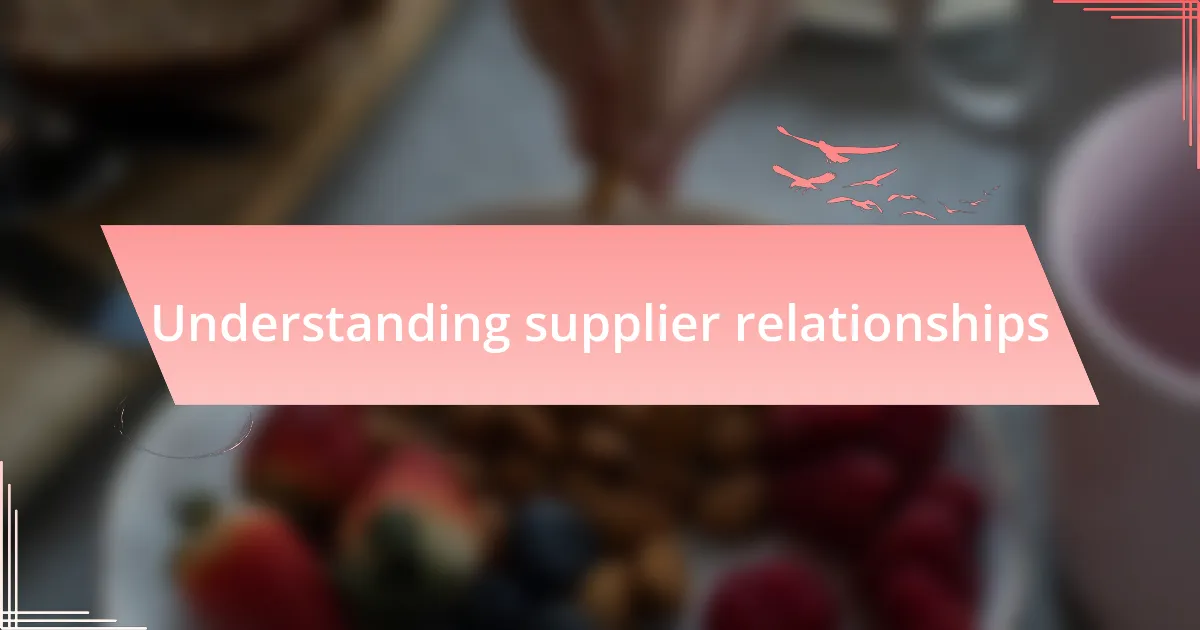
Understanding supplier relationships
Navigating supplier relationships is like tending to a garden; it requires patience, understanding, and regular maintenance. I recall an instance when a supplier struggled with inconsistent deliveries, which almost derailed my inventory. It taught me the critical importance of open communication. I realized that asking them what challenges they faced opened doors to collaboration rather than confrontation.
Building trust with suppliers can be a game changer. I remember when I took the time to understand a supplier’s business and their pressures, it forged a strong partnership. Have you ever considered that they might be as invested in your success as you are in theirs? By nurturing those connections, I found that we could work together to solve problems creatively, leading to better outcomes for both parties.
It’s also worth noting that not every supplier relationship will flourish. I’ve had to make tough decisions with suppliers who couldn’t meet my standards. Reflecting on those experiences, how do you decide when it’s time to move on? Balancing loyalty with performance is tricky, but putting my business first ultimately led me to better partnerships. Understanding where these relationships stand can truly shape the longevity and success of your food business.
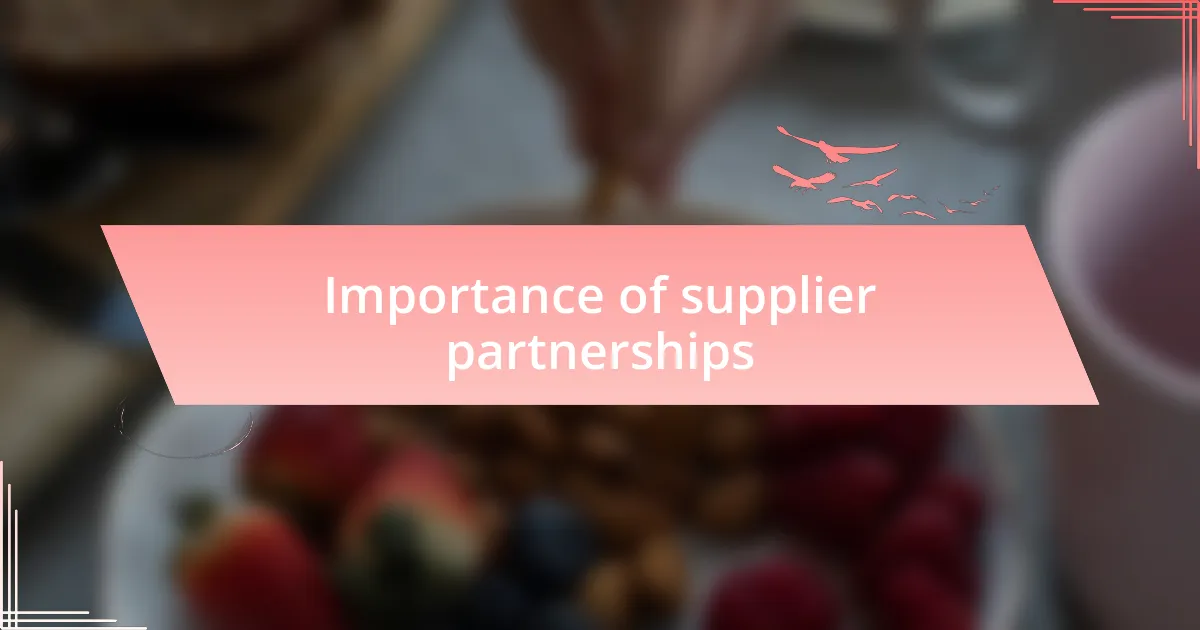
Importance of supplier partnerships
Building robust supplier partnerships is crucial in the food industry. When I first started, I overlooked the value of aligning my goals with those of my suppliers. One day, I learned that my supplier was facing unexpected challenges due to rising ingredient costs. A simple chat about their struggles not only deepened our partnership but also allowed us to adjust our pricing models collaboratively. Isn’t it interesting how mutual support can transform a transactional relationship into a thriving partnership?
Another pivotal moment came when sourcing seasonal produce. I remember the thrill of partnering with a local farmer who was just as passionate about quality as I was. We worked together to synchronize our harvest and delivery schedules, showcasing the best of what each season had to offer. This experience taught me that when suppliers are invested in the success of your business, you can create offerings that truly resonate with customers. Do you think your suppliers would share similar enthusiasm if they felt connected to your business’s vision?
Moreover, relying on strong supplier partnerships can provide a safety net during unforeseen disruptions. One time, a major supply chain hiccup forced me to rethink my inventory strategy. I reached out to a trusted supplier who immediately provided alternatives, ensuring I could maintain my service without compromising quality. That instance reinforced my belief that having a dependable network can be a lifeline in crisis. How prepared is your network to support you when unexpected challenges arise?

Key factors in supplier selection
When selecting suppliers, quality is often the most critical factor. I learned this the hard way when I first prioritized price over product excellence—only to end up with subpar ingredients that disappointed my customers. Ever since, I’ve made it a point to deeply evaluate product quality during the selection process. After all, isn’t it better to invest a little more for top-notch ingredients than to risk losing customers due to inferior products?
Another key consideration is reliability. Early in my journey, I partnered with a supplier who frequently missed delivery windows, causing chaos in my kitchen. That experience taught me that dependable delivery can make or break a business’s operations. Have you considered how a supplier’s reliability impacts not only your workflow but also your customer satisfaction?
Finally, alignment of values can not be underestimated. I once collaborated with a supplier focused on sustainable practices, which resonated well with my brand’s commitment to environmentally-friendly sourcing. This alignment not only strengthened our working relationship but also enhanced my brand image. Are your suppliers aligned with your business values, and how does that alignment influence your customers’ perception?
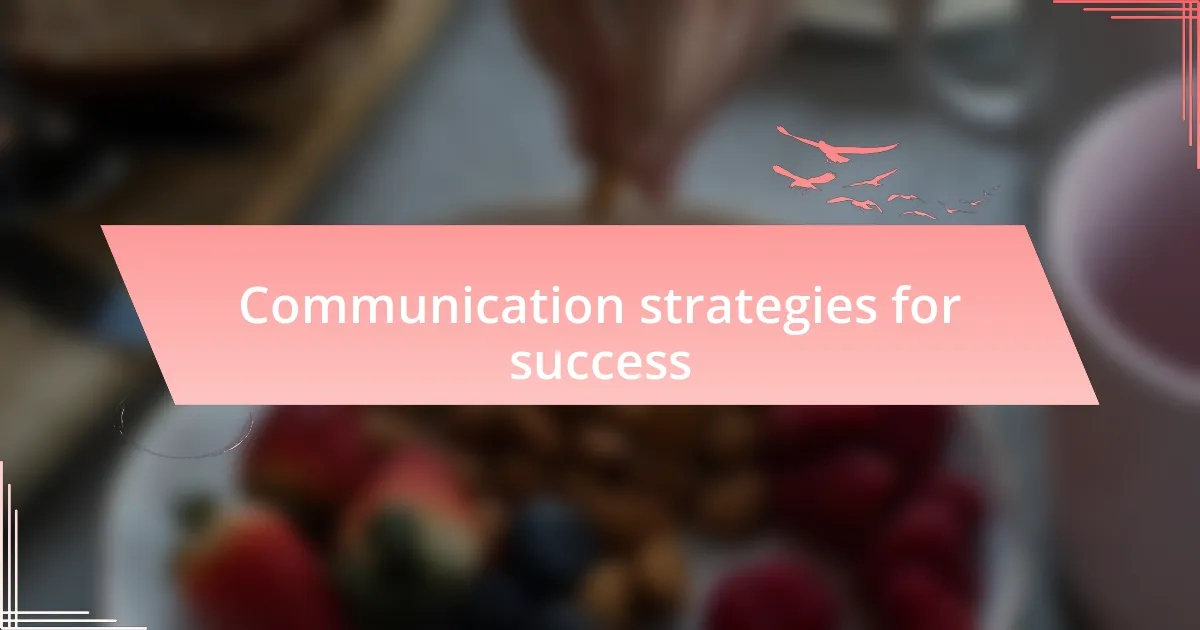
Communication strategies for success
Effective communication is the bedrock of strong supplier relationships. I remember a time when I assumed my supplier understood my needs without clear discussion. When my orders arrived mismatched, it underscored how critical open dialogue is for defining expectations. Have you articulated your specific requirements to your suppliers? Clear communication ensures everyone is on the same page, ultimately saving time and reducing frustration.
Regular check-ins can also fortify your connection with suppliers. I have found that scheduling brief, consistent meetings fosters a sense of partnership that goes beyond transactional exchanges. These conversations not only address any concerns but also explore opportunities for collaboration, making you both stakeholders in each other’s success. How often do you take the time to connect with your suppliers beyond just placing orders?
Lastly, embracing feedback plays a vital role in enhancing supplier relationships. In my experience, I’ve learned that being open to their input can yield valuable insights that improve my operations. For instance, a supplier once suggested an alternative ingredient that not only lowered costs but also increased flavor. Have you considered how your suppliers’ expertise could enhance your product offerings? Engaging in this two-way feedback process cultivates a more dynamic and fruitful relationship.
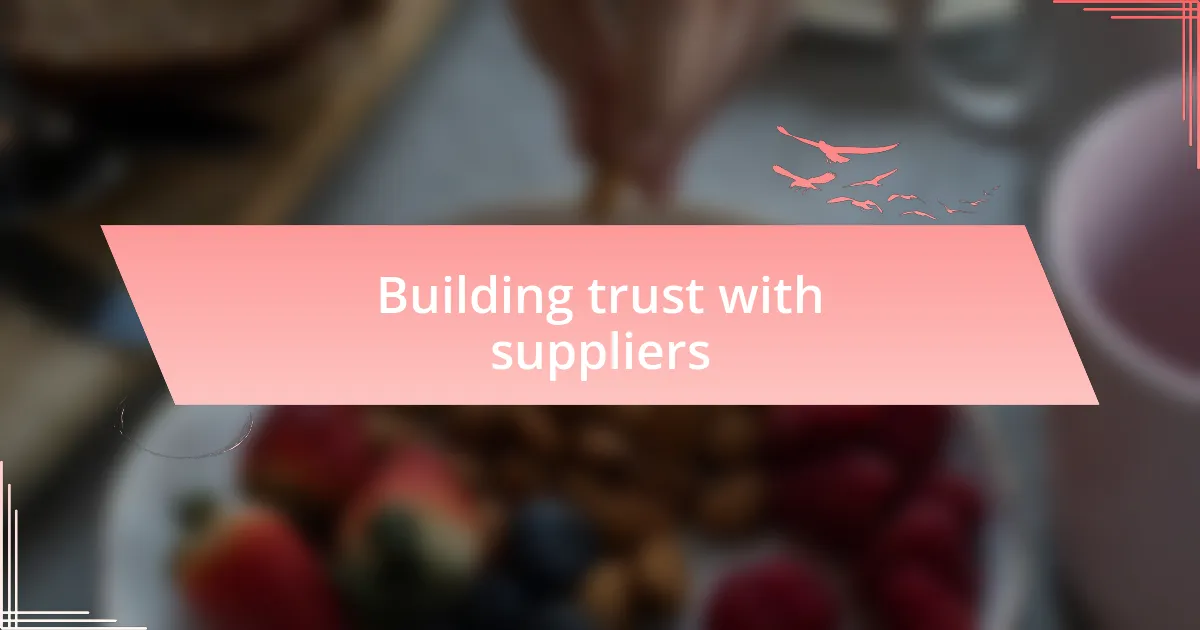
Building trust with suppliers
Building trust with suppliers is essential for long-term success. I once worked with a supplier for a particularly important event. When they unexpectedly delivered late, I felt a wave of panic. However, rather than expressing frustration, I chose to understand their perspective. This approach opened up a dialogue about their challenges, ultimately laying a foundation of trust that has benefited both of us in the long run. Have you taken the time to see your suppliers as partners, rather than just vendors?
A key aspect of building trust lies in transparency. I recall a situation where I faced unexpected fluctuations in my demand, leading me to communicate openly with my supplier about potential order changes. Their willingness to adapt proved invaluable, and in return, I made sure to express my gratitude. This give-and-take solidified our relationship and established a sense of loyalty that goes beyond a simple business transaction. How openly do you share your challenges and successes with your suppliers?
In my experience, honoring commitments is crucial in nurturing trust. I made a promise to one of my suppliers to provide feedback on a new product they were developing, and I followed through promptly. This small act sent a clear message that I value our partnership. Trust is built on reliability, and showing that you prioritize your commitments can create a ripple effect. Have you reflected on how often you keep your promises in supplier relationships?
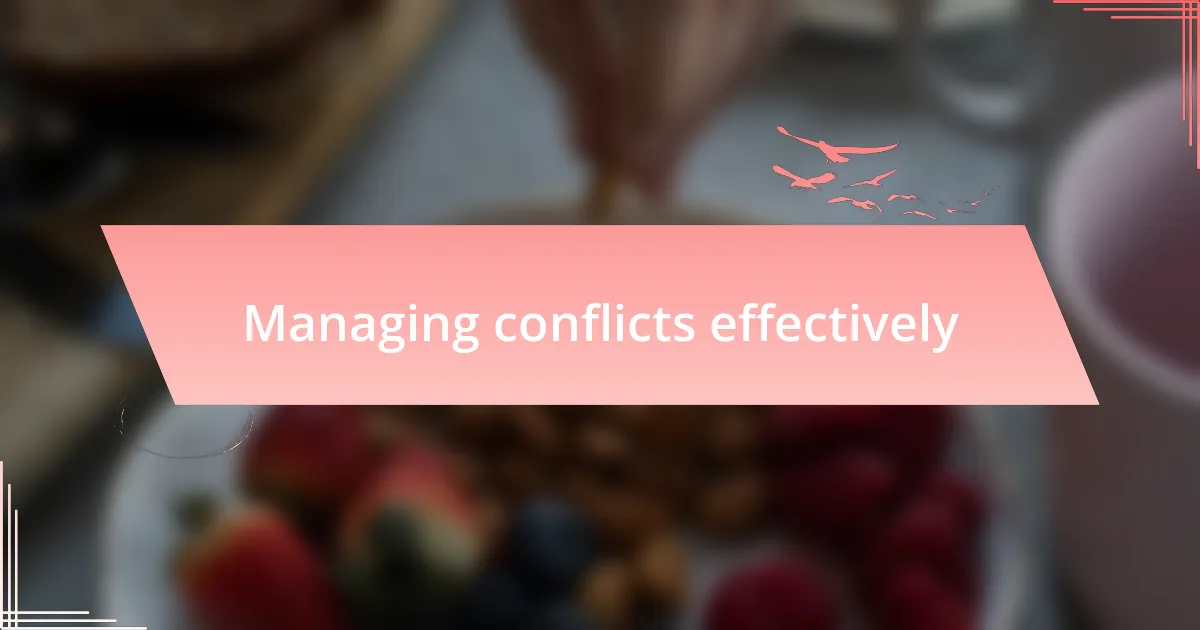
Managing conflicts effectively
When conflicts arise with suppliers—which they inevitably do—I find that staying calm and focusing on finding solutions is key. I once had a disagreement over pricing that left both sides feeling frustrated. Instead of escalating the issue, I proposed a meeting where we could explore options together. This collaborative approach not only resolved the conflict but also strengthened our partnership, reminding me that conflict can be an opportunity for improvement rather than a setback.
In my experience, active listening plays a significant role in conflict resolution. During a particularly tough negotiation, I made it a point to listen carefully to my supplier’s concerns. That effort led me to understand their constraints better and, surprisingly, discover a creative way to meet both our needs. Have you considered how much listening can transform a tense situation into a productive conversation?
Sometimes, demonstrating empathy can turn a potentially damaging conflict into a learning moment. I remember dealing with a supplier who was struggling with their production capabilities. Rather than placing blame, I expressed my awareness of their situation and offered to support them by adjusting my orders temporarily. That gesture helped us navigate the conflict while building a deeper connection that has proven to be invaluable over time. How often do you allow empathy to guide your interactions during conflicts?
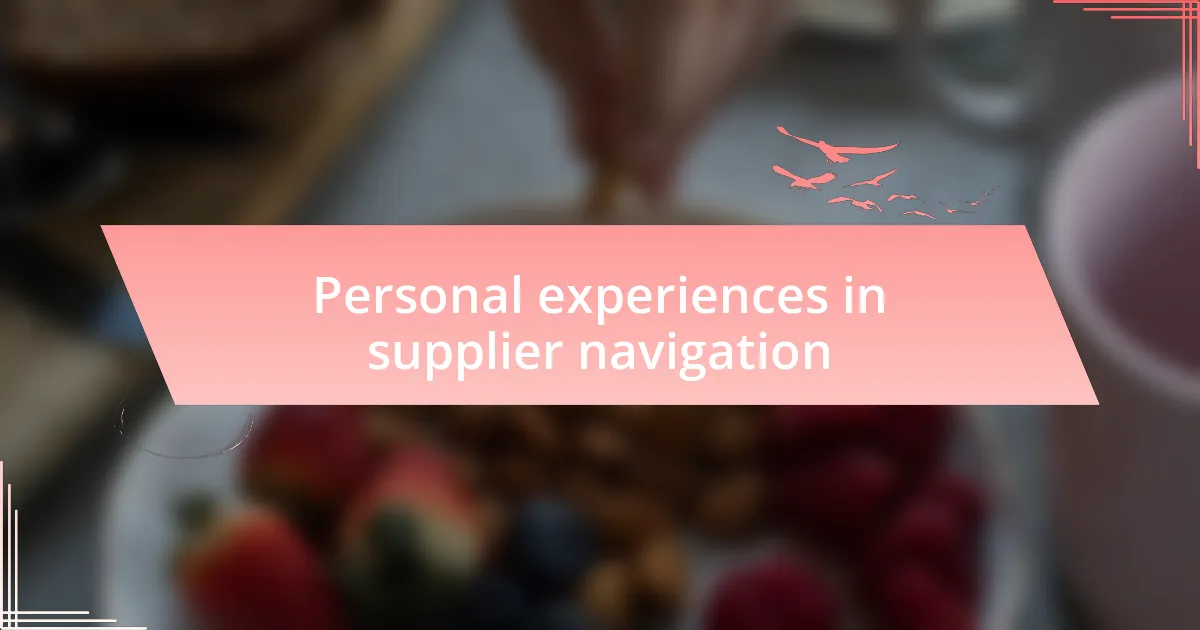
Personal experiences in supplier navigation
I remember my early days in the food business when I was still learning the ropes of navigating supplier relationships. One time, I was caught off guard by a sudden change in delivery schedules. Instead of panicking, I reached out directly to the supplier to express my concerns. Their candid explanation helped me appreciate the complexities they faced, forcing me to rethink how I need to prepare for uncertainties in supply chains. Have you ever had a moment that shifted your perspective on a supplier’s operations?
Building trust has also been pivotal in my experience. On one occasion, I took the initiative to visit a supplier’s facility. Seeing their operations firsthand and chatting with their team fostered a mutual understanding that simply couldn’t be achieved over emails or calls. I could sense their commitment to quality, which reassured me and reinforced our partnership. Isn’t it fascinating how a personal touch can deepen professional relationships?
Another lesson I learned was the importance of transparency in communication. During a challenging period, I had to adjust my forecasts due to changing market demands. I thought long and hard about how to communicate this without causing alarm. When I finally shared my thoughts with my supplier, they were grateful for my honesty and responded with their insights. This openness not only mitigated tension but also paved the way for innovative solutions. Have you explored how being transparent can reshape your dynamics with suppliers?